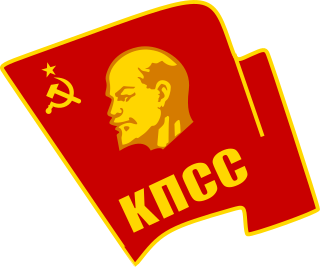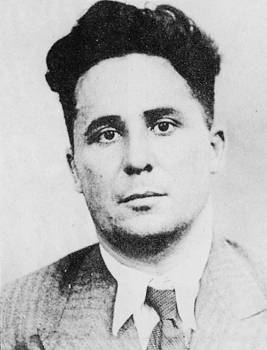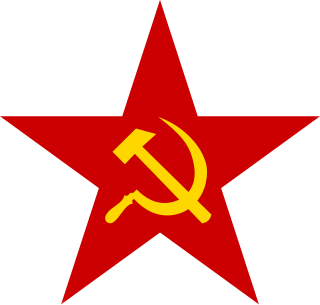Related Research Articles

The Communist Party of the Soviet Union (CPSU), at some points known as the Russian Communist Party (Bolsheviks) and All-Union Communist Party (Bolsheviks), sometimes referred to as the Soviet Communist Party (SCP), and formerly known as the Bolshevik Party, was the founding and ruling political party of the Soviet Union. The CPSU was the sole governing party of the Soviet Union until 1990 when the Congress of People's Deputies modified Article 6 of the 1977 Soviet Constitution, which had previously granted the CPSU a monopoly over the political system. The party's main ideology was Marxism-Leninism.

The Soviet Union, officially the Union of Soviet Socialist Republics (USSR), was a transcontinental country that spanned much of Eurasia from 1922 to 1991. A flagship communist state, it was nominally a federal union of fifteen national republics; in practice, both its government and its economy were highly centralized until its final years. It was a one-party state governed by the Communist Party of the Soviet Union, with the city of Moscow serving as its capital as well as that of its largest and most populous republic: the Russian SFSR. Other major cities included Leningrad, Kiev, Minsk, Tashkent, Alma-Ata, and Novosibirsk. It was the largest country in the world, covering over 22,402,200 square kilometres (8,649,500 sq mi) and spanning eleven time zones.

The Communist International (Comintern), also known as the Third International, was an international organization founded in 1919 that advocated world communism, and which was led and controlled by the Communist Party of the Soviet Union. The Comintern resolved at its Second Congress in 1920 to "struggle by all available means, including armed force, for the overthrow of the international bourgeoisie and the creation of an international Soviet republic as a transition stage to the complete abolition of the state". The Comintern was preceded by the dissolution of the Second International in 1916.
The Jewish Anti-Fascist Committee, abbreviated as JAC, was an organization that was created in the Soviet Union during World War II to influence international public opinion and organize political and material support for the Soviet fight against Nazi Germany, particularly from the West. It was organized by the Jewish Bund leaders Henryk Erlich and Victor Alter, upon an initiative of Soviet authorities, in fall 1941; both were released from prison in connection with their participation. Following their re-arrest, in December 1941, the Committee was reformed on Joseph Stalin's order in Kuibyshev in April 1942 with the official support of the Soviet authorities. In 1952, as part of the persecution of Jews in the last year part of Stalin's rule, most prominent members of the JAC were arrested on trumped-up spying charges, tortured, tried in secret proceedings, and executed in the basement of Lubyanka Prison. Stalin and elements of the KGB were worried about their influence and connections with the West. They were officially rehabilitated in 1988.

Nikos Zachariadis was the General Secretary of the Communist Party of Greece (KKE) from 1931 to 1956, and one of the most important personalities in the Greek Civil War.

The Revolutionary Military Council, sometimes called the Revolutionary War Council or Revvoyensoviet (Реввоенсовет), was the supreme military authority of Soviet Russia and later the Soviet Union. It was instituted on September 2, 1918 by decree of the All-Russian Central Executive Committee (VTsIK), known as the "Decree Declaring the Soviet Republic Military Camp".

The Zhenotdel (Женотдел), the women's department of the Central Committee of the All-Russian Communist Party (Bolsheviks), was the section of the Russian Communist party devoted to women's affairs in the 1920s. It gave women in the Russian Revolution new opportunities until it was dissolved in 1930.

The Federation of International Bandy is the international governing body for the sport of bandy, including the variant called rink bandy. The federation is headquartered in Simrishamn Municipality, Sweden.
The Union of Russian Composers is a state-created organization for musicians and musicologists created in 1932 by Joseph Stalin in the last year of the Cultural Revolution and first Five-Year Plan. It became the official replacement for the various artistic associations which were present before like the Association for Contemporary Music and the Russian Association of Proletarian Musicians, two of the independently directed, music committees. According to Richard Taruskin, the Union had fully materialized into its full-form well before 1948 and in time for the delivery of Zhdanov's Doctrine.

Wolfgang Leonhard was a German political author and historian of the Soviet Union, the German Democratic Republic and Communism. A German Communist whose family had fled Hitler's Germany and who was educated in the Soviet Union, after World War II Leonhard became one of the founders and leaders of the German Democratic Republic until he became disillusioned and fled in 1949, first defecting to Yugoslavia and then moving to West Germany in 1950 and later to the United Kingdom. In 1956 he moved to the United States, where he was a popular and influential professor at Yale University from 1966 to 1987, teaching the history of communism and the Soviet Union, topics about which he wrote several books. After the Cold War ended, he returned to Germany.

Amicii URSS, which carries the same meaning) was a cultural association in interwar Romania, uniting left-wing and anti-fascist intellectuals who advocated a détente between their country and Joseph Stalin's Soviet Union. Created in the spring of 1934 by Petre Constantinescu-Iași, an activist of the previously outlawed Romanian Communist Party, the society took its inspiration from the French Amis de l'URSS and from the worldwide network. Actively encouraged and financed by the Comintern, Amicii URSS was viewed with suspicion by authorities — never officially registered, it was eventually banned on the orders of Premier Gheorghe Tătărescu on November 25, 1934. It ceased its activity after that point, but constituted a precedent for the Romanian Society for Friendship with the Soviet Union (ARLUS).

Semyon Grigoryevich Morozov was commissar of the Taganrog antifascist underground organization (1941–1943). He was posthumously awarded the Hero of the Soviet Union title.
The World Veterans Federation (WVF) is the world's largest international veteran organisation. The federation consists of 172 veterans organizations from 121 countries representing some 60 million veterans worldwide.
The Congress of American Women was an American women's rights organization. It was founded in New York on International Women's Day, March 8, 1946, following the 1945 founding conference of the Women's International Democratic Federation in Paris, to which it affiliated. Its primary organizer was Elinor S. Gimbel. In 1948 the organization was attacked as a communist front organization by the House Un-American Activities Committee and was forced to register as a "subversive" organization. The organization was finally dissolved in 1950.
A communist front is a political organization identified as a front organization under the effective control of a communist party, the Communist International or other communist organizations. They attracted politicized individuals who were not party members but who often followed the party line and were called fellow travellers.

The International Federation of Resistance Fighters – Association of Anti-Fascists also known by its French initials FIR is an organization of veterans of the anti-Axis resistance fighters, partisans, members of the anti-Hitler coalition. During the Cold War, the work of the FIR was closely connected with issues of peace, disarmament, understanding and cooperation of countries of different political systems. The FIR gave the former resistance fighters a voice against the policy of military confrontation and the real threat of war. Member organizations in West and East took numerous initiatives to end the policy of confrontation.

The Executive Committee of the Communist International, commonly known by its acronym, ECCI (Russian acronym ИККИ - for Исполнительный комитет Коммунистического интернационала), was the governing authority of the Comintern between the World Congresses of that body. The ECCI, established by the Founding Congress of the Comintern in 1919, was dissolved with the rest of the Comintern in May 1943.

The Women's Antifascist Front, was a Yugoslav feminist and anti-fascist mass organisation. The predecessor to several feminist front groups in the former Yugoslavia, and present-day organisations in the region, the AFŽ was heavily involved in organising and participating in the Partisans, the communist and multi-ethnic resistance to Nazi occupation of Yugoslavia during World War II.
The Russian People's Labour Party, or Russian National Labour Party, was a collaborationist organisation, formed by the administration of Oflag XIII-B POW camp from the prisoned Soviet Russian members of the Red Army in 1941. All "party" activities were overseen by German counter-intelligence (Abwehr).
References
- ↑ Нагорная, Оксана Сергеевна. Женщины в структурах советской культурной дипломатии холодной войны: пространства мобилизации и практики соучастия // Новейшая история России : Междисциплинарный научно-политический журнал. — 2020. — Т. 10, № 2. — С. 451-468. — ISSN 2309-7973.
You can help expand this article with text translated from the corresponding article in Russian. (December 2022)Click [show] for important translation instructions.
|